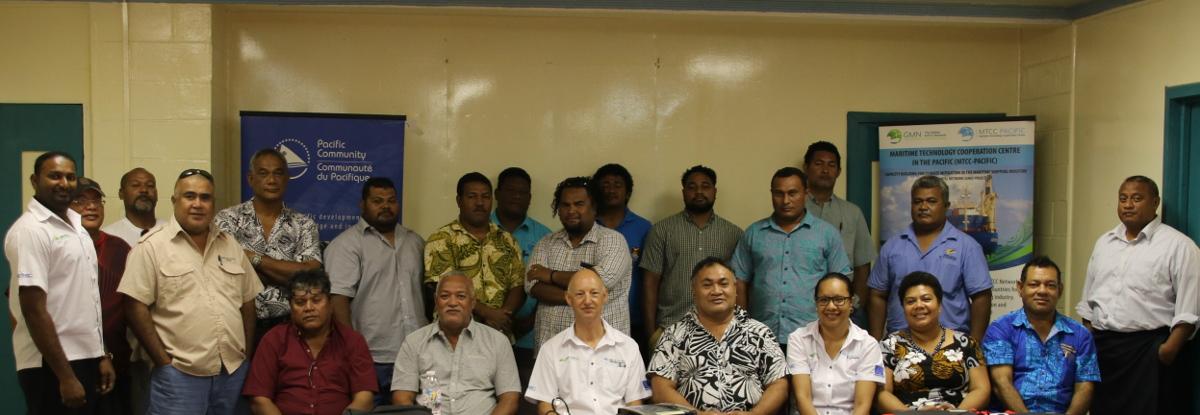Sea transportation is crucial to the economic development and sustainability of Pacific Island countries (PICs) and the Tuvalu government has called upon the maritime transport sector to make shipping safer and more energy efficient. The call was made at the National Workshop on Ship Energy Efficient Operations, delivered by the Maritime Technology Cooperation Centre in the Pacific (MTCC-Pacific) 9-11 May, 2018.
Domestic ships’ fuel oil consumption and greenhouse gas (GHG) emissions could be reduced significantly by applying ship energy efficient operational measures and retrofitted technologies. MTCC-Pacific is on the cutting edge of climate-change mitigation and, at the same time, is opening up a world of opportunities for those who participate. The 2.5-day workshop provide participants with an understanding of the latest developments at the international level; new technologies, tools and methods available to monitor and reduce energy from the operations of ships in Tuvalu, in order to contribute to national efforts to reduce GHG emissions.
The Workshop participants agreed to implement relevant actions to continue progress towards safe and energy efficient shipping in Tuvalu and recognised priority actions such as capacity building, implementation of laws and standards and gaining access to new technologies.
In his welcome remarks, Mr. Falasese Tupau, Acting CEO of Ministry of Communication and Transport, reiterated that more needs to be done to account for emissions from the global shipping industry. “We need to quantify the emissions from our vessels through MTCC-Pacific’s data collection regime and address and further reduce our GHG emissions from the shipping industry. I hope this workshop will lay the foundation for innovation in the shipping industry to be more environmentally friendly in terms of fuel oil consumption, energy consumption and uptake of energy efficient technology.”
SPC’s (Maritime) Transport Greenhouse Gas Advisor recapped the commitments from MTCC-Pacific, its Host Institutions and its partners to assist the Pacific region in climate mitigation in the maritime industry and was “pleased with the commitment shown by leaders in Tuvalu and confident that the knowledge shared during this week will make a positive impact toward energy efficiency targets”.
MTCC-Pacific is one of the five centres established worldwide and forms part of the Global MTCC Network (GMN), implemented by the International Maritime Organization (IMO) and funded by the European Union. The Pacific Community (SPC) host MTCC-Pacific in collaboration with the Secretariat of the Pacific Regional Environment Programme (SPREP) as part of its approach to support sustainable maritime transport in the Pacific with a focus on safety and energy efficiency of domestic shipping and port.
MTCC-Pacific technical assistance is provided in conjunction with the SPC’s Pacific Islands Domestic Ship Safety (PIDSS) programme that aims at supporting domestic ship operators implement safety management systems on board their vessels. This constitutes a consistent approach in raising safety and efficiency standards in domestic shipping. PIDSS is implemented in 8 countries, 66 companies and 114 domestic ships in the Pacific.
The recent Marine Environment Protection Committee (MEPC) Resolution 72 (9-13 April 2018) ‘IMO Strategy’ to reduce greenhouse gas emissions by up to 50% by 2050 compared to 2008. In its first 12 months of operations, the Centre has made significant progress and is already having a major influence in the region.
The Centre has provided training to more than 100 people in 4 targeted countries in the Pacific on shore and ship energy efficiency operations and carried out capacity building and technical support activities on board 9 vessels total in Fiji, its host country, Marshall Islands, Solomon Islands, Vanuatu, and Tuvalu now, with Samoa, and Kiribati to follow.
Media contacts:
Lore CROKER, Administration and Information Assistant, [email protected]
Useful links:
